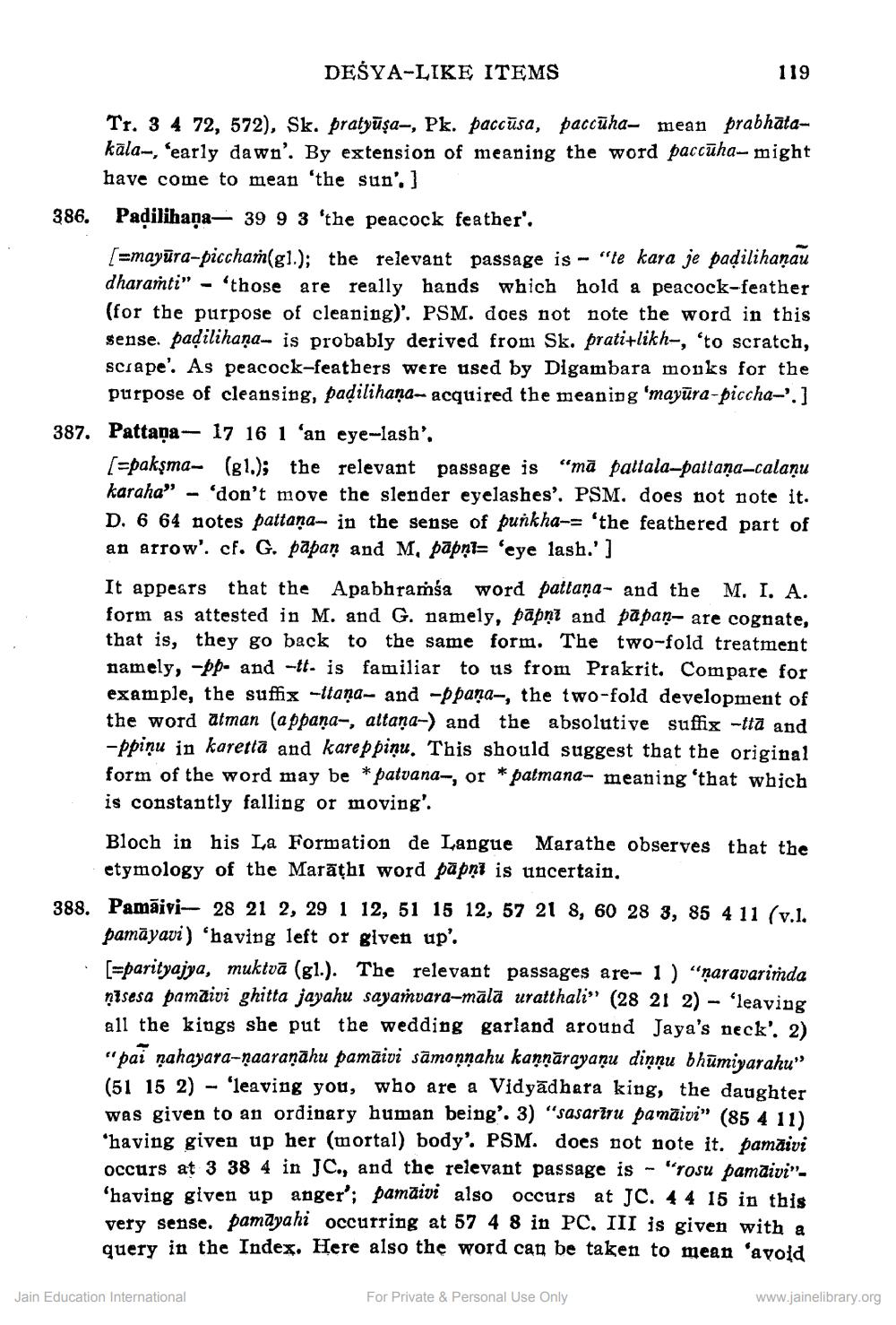________________
DEŚYA-LIKE ITEMS
119
Tr. 3 4 72, 572), Sk. pratyüşa, Pk. paccūsa, paccüha- mean prabhatakala-, 'early dawn'. By extension of meaning the word paccūha- might have come to mean the sun.]
386. Padilihaņa— 39 9 3 'the peacock feather'.
[=mayūra-piccham(gl.); the relevant passage is - "te kara je padilihaņau dharasti" - 'those are really hands which hold a peacock-feather (for the purpose of cleaning)'. PSM. does not note the word in this sense. padilihana- is probably derived from Sk. prati+likh-, 'to scratch, scrape'. As peacock-feathers were used by Digambara monks for the purpose of cleansing, padilihana- acquired the meaning 'mayūra-piccha-'.]
387. Pattana- 17 16 1 'an eye-lash',
[=pakşma- (gl.); the relevant passage is "mā pattala-pattana-calanu karaha" - 'don't move the slender eyelashes'. PSM, does not note it. D. 6 64 notes pattana- in the sense of punkha-= 'the feathered part of an arrow'. cf. G. papan and M, paoni= 'eye lash.']
It appears that the Apabhraíśa word pattaņa- and the M. I. A. form as attested in M. and G. namely, pāpni and papan, are cognate, that is, they go back to the same form. The two-fold treatment namely, -pp- and -tt. is familiar to us from Prakrit. Compare for example, the suffix -Itana- and - paņa-, the two-fold development of the word atman (appaņa-, altaņa-) and the absolutive suffix -tta and - ppiņu in karetta and karep pinu. This should suggest that the original form of the word may be * patvana-, or * patmana- meaning that which is constantly falling or moving'. Bloch in his La Formation de Langue Marathe observes that the
etymology of the Marathi word pāpņi is uncertain, 388. Pamāivi- 28 21 2, 29 1 12, 51 15 12, 57 21 8, 60 28 3,85 4 11 (v.l.
pamāyavi) 'having left or given up'. . [=parityajya, muktvā (gl.). The relevant passages are- 1) "naravarimda
nisesa pamäivi ghitta jayahu sayamvara-māla uratthali” (28 21 2) - 'leaving all the kings she put the wedding garland around Jaya's neck'. 2) "pai ṇahayara-naaranähu pamäivi sāmannahu kannārayaņu diņņu bhūmiyarahu", (51 16 2) - "leaving you, who are a Vidyadhara king, the daughter was given to an ordinary human being'. 3) "sasarīru pamäivi” (854 W). 'having given up her (mortal) body'. PSM. does not note it. pamäivi occurs at 3 38 4 in JC., and the relevant passage is - "rosu pamaivi"'having given up anger'; pamäivi also occurs at JC. 44 15 in this very sense. pamayahi Occurring at 57 4 8 in PC. III is given with query in the Index. Here also the word can be taken to mean 'avoid
Jain Education International
For Private & Personal Use Only
www.jainelibrary.org




